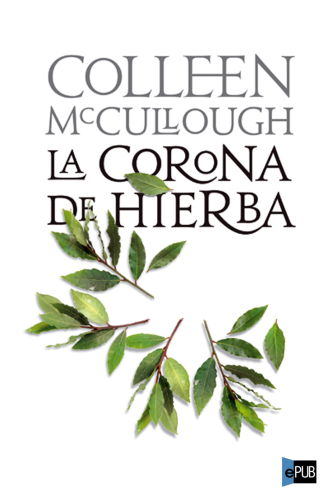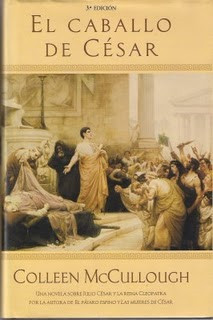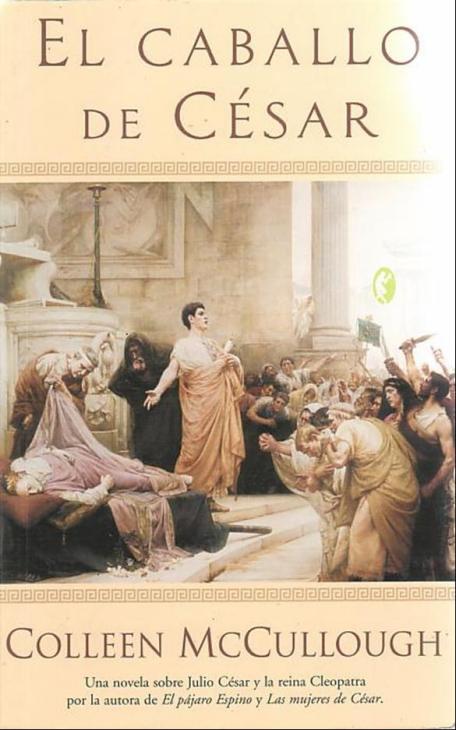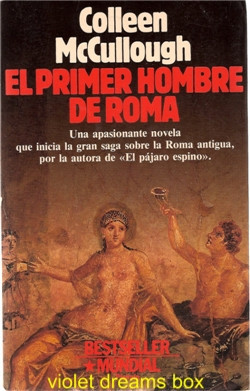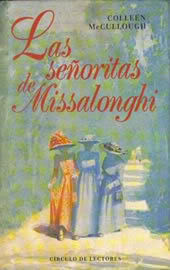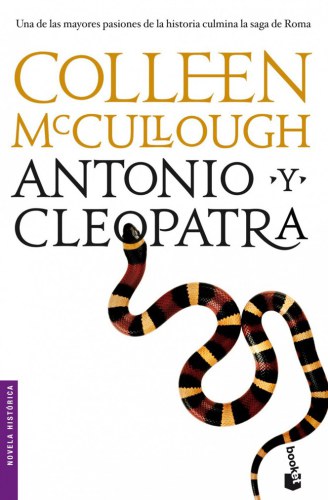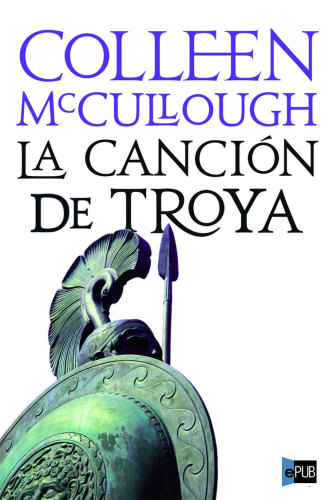oleebook.com
César de Mccullough, Colleen
de Mccullough, Colleen - Género: Ficcion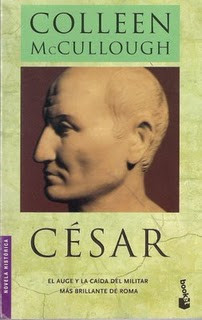
Sinopsis
Corre el año 54 A.J.C. y Cayo Julio César avanza por la Galia aplastando a los feroces reyes guerreros que se cruzan en su camino. Sus victorias en nombre de Roma son épicas, pero los líderes de la república no están satisfechos... están aterrados. ¿Hasta dónde llegará la ambición sin límites del militar más brillante de Roma?
Descargar
Descargar César ePub GratisLibros Recomendados - Relacionados
Reseñas Varias sobre este libro
Caesars Women, #4 in the Masters of Rome Series by Colleen McCullough was one hell of a work-out. This is my least favourite of this series, but I still loved it. Let me explain.
Caesars Women isnt the best title. Sure, there are numerous key women in this instalment, and many bump into the rake- Julius Caesar, many even partake in horizontal refreshments with the man. In fact, Caesar uses this act, putting his body on the line if you , to cuckhold various political opponents. He was prolific in this regard.
The three prominent women in his life, and in this story, were his mother Aurelia (a wonderful, strong, no-nonsense type, a true Matriarch), Julia (Caesars beautiful daughter, perfect in every way betrothed to an acne ridden, uncertain, young Brutus, and later handed over to Pompey the Great some 30 plus years her senior), and his main lover Servilia (Caesers main sex interest vampish, sexy, an absolute Machiavillianette, oh and she's Brutus mum, a political player extraordinaire).......yes, THAT Brutus.
Servilia Brutus mother, Caesars primary lover
So yes, there is a focus on some significant women in Caesars life here BUT, this is really ALL about politics. In other words, the political rise of Julius Caesar. The juror, orator, charmer, looker, senior consul, fixer and lets not deny it, well hung Patrician. Sure, hes had some minor military success in the East as a young man, but his major military campaigns eight years of genocide in Gaul, are yet to come this will be the story of #5 in the series Caesar I expect.
But heck this was so, so heavy on politics.
Aurelia Caesars mother, what a woman this lady was large and in charge
My word I miss the gargantuan characters of Marius and Sulla in previous instalments, the wars, the military shenanigans with only a dash of politics thats my ideal cocktail. If you read this episode, youll have none of those famous military campaigns, none of the slashing and burning, the fights within and without. This is about the Senate, the Tribune of the Plebs, the Equestrian class, Consuls, Magistrates, Praetors, Governors, and law courts the list goes on. But we meet interesting characters Cato, Cicero (oh what a wordsmith he could filibuster with the best of them, and he knew it), Catilina, Hybrida, Curio, Bibulus, Crassus, Ahenobarbus (Neros ancestors the real Ginger Ninjas, a horrible lot really), Piso and so many more. Put it this way, there were around 600 Senators I think I met half of them.
Cicero one of Caesars political foes. Cicero was fundamental in exposing the Catiline Conspiracy, which resulted in the execution of the conspirators without trial (massive scandal). This famous incident is covered in this book
So, this was dry at times perhaps too often. You know the type of book when you pick it up and ones eyelids become heavy within 5 minutes. Yes, that riveting. But it was wonderful the amount of research Mrs Mac must have done wouldve been colossal. The 200-page appendix is a testament to that.
But, slogging through this one has been well worth it I feel this fascinating period of pre-Imperial Rome is very much embedded in my marrow now. Something that can only be attained by spending too much time absorbing material such as this. Sure, this is historical fiction, and Mrs Mac takes liberties, but when one randomly checks the main story points to be sure, they did happen.
This is one for devoted lovers of Ancient Rome.
4 Starsancient-rome chunkster colleen-mccullough ...more58 s2 comments LeAnnAuthor 5 books80
In Caesar's Women, McCullough finally hits her storytelling stride. Caesar really comes to life, and what a life that is. McCullough is a sympathetic biographer who persuasively fills in the historical outline for Caesar's political career in the fourth novel in her Masters of Rome series, covering roughly ten years. The novel reflects the important women in his life, his mother Aurelia, his daughter Julia, and his mistress Servilia, with minor roles played by his last two wives Pomponia and Calpurnia. The title also alludes to Caesar's prolific female conquests, which McCullough imagines came about due to a marriage between Caesar's strong sexual appeal to women of all classes and his political need to take his rivals down a notch (as well as to prove that he wasn't gay, which was whispered by his envious rivals to a homophobic Roman society).
McCullough admits in her author's note that this novel has the richest historical source material, thereby being much covered by modern writers but also allowing her to detail the patrician Roman woman's life better. It's rather telling that McCullough has convinced this modern woman, who disdains powerful philanderers and suspects sexual psychopathy in individuals who hurt others through repeated casual use, that Caesar not only cared for the women in his life, but that they fully accepted who and what he was. Roman wives of the pre-Christian era expected their husbands to be incontinent; sex was a male bodily hunger that had little to do with marriage. Moreover, marriage was a legal relationship that didn't require fidelity on the man's part.
Besides showing Caesar's domestic relationships, which underpin his political life, McCullough weaves a story of his increasingly hostile interactions with the boni, a group of ultra-conservative Senators who oppose anything Caesar does out of personal animosity. Caesar intends to be the First Man in Rome, to enlarge his personal dignitas until it is synonymous with Rome's, but he wants to make Rome greater in doing so. The boni, however, are quite determined to prevent any man from being greater than his peers. They simultaneously acknowledge Caesar's greater ability while insisting that he can't be greater than they are. They fear that he will make himself a king.
For modern political junkies, reading the ever-increasing dysfunction of the Roman Republic's last days is quite eye-opening. Roman government grinds to a standstill as powerful Senators maneuver to block one another, or bribe electors and jurists, or interpret law to suit their exigencies, or manipulate legal calendars to take advantage of magistrates' short terms in office. Caesar, while a catalyst for some of the filibustering and gridlock, is also capable of cutting the Gordian knot and ruling with a firm, brilliant hand. Although it takes years, decades even, to bring Caesar to his breaking point, McCullough painstakingly lays the groundwork for his famous ride over the Rubicon and his eventual assassination by his implacable, envious enemies.
22 s Paula Hebert234 3
I really wish they could have found a better title for this book, it smacks of soft porn and ripped bodices, but that being said, mcculllough is at her usual suberb best, bringing ancient history to life and giving you a feeling of having been there with them. granted. caesar was surrounded by women. his incredible strong mother aurelia, three wives, one died in childbirth leaving him a daughter, one whom he divorced, and then his last. he also was a notorious womanizer, who took great pleasure in cockolding his political enemies, and had a particularly nasty mistress. that being said, they had no impact on his life unless they happened to work to his political advantage in some way. he preferred the warfields to rome, and was happiest when he was adding to romes empire or setting sensible systems in place so that empire would run more efficiently. we also learn more about both cicero and cato's lives, which is really interesting, and brought to life with colorful prose. caesar spent his time in rome doing what he had to do to go through the steps necessary to advance in the senate, so that he could then go back into the field. this book leaves us at the end of his consulship, when he is about to leave for the governorship of nearer gaul, that is northern italy, to hopefully make his next fortune. great and accurate historical fiction.13 s Gumble's Yard - Golden Reviewer1,908 1,486
Fourth in the Masters of Rome series, this book has two main themes:
The first is the rise of Caesar, which McCullough portrays (as the title advertises) from the point of view of the women in his life: particularly his influential and independent mother Aurelia (the one person Sulla regarded as an equal); his torrid affair with the ruthless Servilla (half-sister of Cato and mother of Brutus); his devotion to his daughter Julia, initially betrothed to Brutus but then married to Pompey in a love and political match, as well as the Vestal Virgins for whom he takes responsibility after being elected Pontifex Maximus. Interestingly Caesars two wives during this period are barely mentioned except in terms of the divorce of the first (following Clodiuss gatecrashing of a female religious ceremony at Caesars house meaning she was no longer above suspicion) and the marriage of the second (purely for expedient political purposes on behalf of the Triumvirate). We also get an excellent perspective on his money issues and his desperate attempts to continually stave off his creditors (and possible Senate disqualification), which he achieves by his religious appointment, his Praetorship in Spain and then at the end of the story by attempting to secure Gaul as a pro-consular Province.
The second is the growing battle between the conservative faction in the Senate personified by the traditionalist, sanctimonious Cato who aim to maintain the republican status quo, and the three tall poppies Pompey (hugely rich, possessed of an enormous army but unable to gain the acceptance and approval of the Roman Patricians), Crassus (the business man and ex-soldier) and Caesar (with Sullas drive, Mariuss popularity and with an unimpeachable pedigree who Cato in particular sees only lacks an army to be an even greater danger than Sulla).
There are two key consular years: that of Cicero when faced with what he sees as a huge conspiracy involving Cataline (and later portrays as one of the greatest ever threats to the history of Rome) invokes emergency powers and orders the immediate execution without trial of a number of the key conspirators; that of Caesar which he runs more as a legislating, populist Tribune of the Plebs than a traditional patrician, despite the attempts of the conservative faction to stop him (including the attempts of his fellow Consul and enemy since he first served in the army Bibulus to declare the whole consul year invalid due to inauspicious omens) with the balance being shifted by the agreement reached before the year-end and broked by Caesar for he, Pompey and Crassus to form an expedient Triumvirate. The authors clear bias towards the Great Men rather than the conservative faction comes out more clearly in this book of the series with the implicit and sometimes explicit assumption that their conservatism is due to their being weaker than the Great Men.
Another excellent book in this series.9 s Emily178 10
The title may make this book sound a romance novel of the Roman Empire, but it's well beyond any such thing (though does include a few rather well scripted sex scenes involving good ol' Caesar). Written with a savant- skill for detail and period-appropriate descriptions and backed up with impeccable research, "Caesar's Women" is the story fo the rise of Julius Caesar and the women who are a part of his life as his star brightens. Although the book sometimes lacked readability due to its dense recounts of Senate verdicts or the sparring of the various Catoes and Luciuses, overall it transported me to a place that fascinates me and gave me a thorough and believable image of a man who does the same. McCullough could do with some more flower in her writing- more adjectives and less antiquated terms- but I'd take her books over pretty, fluffy ones any day.booksofthepast7 s Deborah Pickstone852 91
Can you call this series a modern classic? Well, I just did, so there it is. After abandoning it as awful at the time of publication, I remain spellbound at this 4th book of the eventual 7. The style is odd and sometimes clunky - but I don't care! I never thought I could be so hooked on the story of Rome, which was never a favourite historical period of mine. I am also consistently awed by the breadth of CM's mind and obvious brainpower as she hooks it all together. An astonishing achievement. I keep going off to check facts and dates and haven't caught her in any major dilemma yet.....all-time-faves biographical-novel history-of-all-things ...more7 s Daniel Kenefick56 1 follower
This is a good book, but probably my least favorite in the series (so far). It covers Caesar's early political career, before he went to Gaul and became the Dictator we know and love today. Indeed, it has a bit less military excitement, but plenty of political intrigue to make up for it. So what were my objections?
1. Caesar, the main character, is too perfect. Somehow, this power-hungry demagogue, who was (probably) a part of the major conspiracies of the period that tried to overthrow the Roman state, is portrayed as a good guy. I'm at best an armchair historian, but it takes a very motivated look at the history to cast Caesar in a good light.
In this "Caesar's Women" suffers in comparison to it's immediate predecessor: In "Fortune's Favorites", we see the rise and fall of Sulla, so far the greatest(?) Roman to have lived. We see the good and bad in him (mostly bad), his plotting, his mistakes, and his genuine attempts to repair the Roman state. Finally, we get to watch it all be torn down by another upstart, Pompey. It's a compelling story filled with many flawed characters. In this book, in the same number of pages, we see just a narrow slice of Caesar's career, and Caesar does nothing but win. It almost feels Colleen is writing fan-fiction.
I hope the next book allows Caesar to fail a bit more. The Gallic and Civil wars are so interesting because Caesar was frequently challenged, made and recovered from mistakes, and pulled himself through with a combination of luck and skill. The portrayal of a "Golden Boy Striding Confidently Through History, Towards His Destiny" detracts from the drama, rather than adds.
2. Cicero is portrayed as a bit of a fool. It seems a shame to cast Rome's greatest statesman in this light, but history seems to be a bit of a zero sum game, so where Caesar wins Cicero looses.
In Colleen's defense, she dedicates a good deal of the Author's note at the end to defending her choice for both characterizations: Read it! These notes, plus the appendices, are some of the best part of these series. Briefly, her argument is while modern historians tend to lionize Cicero, most contemporary sources did not hold him in such regard. Similarly, the sources on Caesar for these years of Roman History are probably colored by by his later seizure of power, so his participation in the Catiline conspiracy might be more conjecture than fact.
Recommendations: For a different (more heroic) take on Cicero and the events of the late Roman republic, I recommend the series starting with Imperium: A Novel of Ancient Rome. There are plenty of biographies of all of these figures, those by Anthony Everitt are my favorite.8 s Steve R1,055 50 Read
This 1996 novelization of Caesars political career in Rome spans a ten year period from 68 to 58 B.C., during which he made significant strides in amassing power within the oligarchical rule of the Senate which existed during the waning years of the Republic. When people think of Caesar, they think of his assassination first, then of his military triumphs and then only pay scant regard to his career as a politician, navigating the curious ins and outs of the Senate, the Consulship, the curule aedileship, the formation of the first triumvirate and his election as Pontifex Maximus. What they totally ignore is his subtle work as a social reformer, who wished to settle the glaring inequities of wealth distribution, land ownership and the provision of Roman citizenship. Even McCulloughs broadly sympathetic retelling of the story of these years largely fails in this regard.
She does spend a lot of time on his two wives, Pompeia and Calpurnia, the political strategy behind his marrying his daughter Julia to Pompey and his long-standing affair with Servilia. Admittedly, these political/romantic affairs are relatively more engaging than the thorny issues of breaking of the power of the oligarchs over land and government, but Michael Parentis The Assassination of Julius Caesar really changed my way of looking at this most interesting (except for maybe Sulla and Marius) of all Roman historical figures.
As always, written in a very flowing style which is as engaging in narrative as it is easy to read. McCullough certainly did her homework and showed her facility as a writer in all seven of her novels in this series.
Highly recommended.6 s GeekChick194 13
I could barely stomach what little I read of this book. I was very excited, because I found this one right as I was discovering historical fiction for the first time. I was sorely let down. Repeated references to various women as "juicy" was so low-brow, I felt I was reading a trashy romance novel. I kept the book around, thinking I might pick it back up, but after several years I just got rid of it. Why waste time when there are so many quality tomes out there?
5 s Vicki Cline779 37
My favorite of the Masters of Rome series. I really the portrayal of domestic life and the politics in Rome. Caesar is portrayed as nearly perfect, and although I admire him a lot, it's a bit hard to believe he was this flawless. The various women of the title are quite interesting. We've met his mother Aurelia in the previous books in the series and get to know her a little better. She appears to be the one person he confides in, not really having any male friends of his own class. We also get to watch his daughter Julia grow up and become politically useful to him. Once he's elected Pontifex Maximus, he has the six Vestal Virgins to watch over, and does a really good job of it. Finally, there's his mistress Servilia, Cato the Younger's half-sister, whom he doesn't really love, but can't seem to give up. The book ends with his leaving Rome for his extended campaigns in Gaul.chat-2009 roman-fiction7 s Olethros2,665 490
-Con todos ustedes ¡el preferido de McCullough!.-
Género. Novela histórica.
Lo que nos cuenta. Pompeyo es el primer hombre de Roma en este momento pero su carácter ha evolucionado y ahora se siente por encima del Senado merced a su gran visión de sí mismo y de su alianza política con el exitoso Craso y el fascinante Cayo Julio César, un joven este último que demuestra toda clase de recursos en su camino, lento pero inexorablemente seguro a pesar de los obstáculos, hacia la cima. Cuarto volumen de la serie Señores de Roma.
¿Quiere saber más de este libro, sin spoilers?
Visite:
http://librosdeolethros.blogspot.com....5 s Simon Mee380 12
"I am going to go as far as I have to go to become the First Man in Rome for as long as I live! And after I die, I will be called the greatest Roman who ever lived!"
I am not sure if I am a Ravenclaw or a Hufflepuff. I am only vaguely Team Jacob. But I have absolute, utterly unshakeable, faith that you will not read a better series than the Masters of Rome:
Cicero, however, had the last word. "Incest," he said gravely to a large crowd of Forum frequenters, "is a game the whole family can play."
I stand by it.
So what the fourth book in Masters of Rome about? Colleen McCulloughs love for one Gaius Julius Caesar.
"Because he's too tall, too handsome, too successful with the women, and too arrogant by far"
Caesar is going to make it to the top of Roman politics while hiding a pilum under his toga. He needs money, he needs allies, and he needs to humiliate his opposition, whether by insults:
"You wouldn't be able to see over the heads of your military escort, though I suppose you could draft dwarves."
or by sleeping with their wives. Anyway, McCullough makes it very clear that Caesars great, finding ways for him to escape opponents, creditors and dead bedrooms:
Id rather masturbate! he said savagely.
and it drives the book up to the end of Caesars first consulship, but Caesar not why I love this book. Instead, what I love are the other characters, each so massively, irremediably, humanly flawed. As the merest, tiniest, piddliest sampling, you have Publius Clodius, the miscreant whos 50 pages of introductory characterisation is the absolute heart and soul of this book, claiming (among other things) he committed incest with both his sisters in order to own his brother-in-law:
"Clodilla deems you a poor substitute for her little brother."
only to later lose control of the narrative:
"Clodia? She wouldn't give me an inch!"
Cicero giggled. "Well, why should she give you an inch when I hear that you give her six of your inches regularly?"
Or Cicero, the New Man derided as the bumpkin, the mushroom, or the timid soul, completely un his contemporary reputation. Known to us for his speeches, instead he will repeatedly giggle or let out an inarticulate bleat. A man of principles to history, here is he an incurable vacillitator. Desperate to do something memorable in his year of consulship, he sniffs out (incites?) a shadowy conspiracy, only to be damned for it and forced into exile by books end:
"On the slenderest of pretexts, you have virtually impeached him."
Or Servila. Haughtiest of patricians; lover of Caesar; mother of a future assassin; crucifer of slaves; sampler of her half-brothers flesh; and, according to Caesar, possessor of a delightfully hairy back.
There are other female characters, and all seem to be in the thrall of Caesar, but Servila is easily the most fully developed. Boredom directs her towards poisoning her full brother to ensure her own son inherits the Gold of Tolosa. Impetuosity leads her to writing a love letter that will risk Caesar's career. Domination of her son will doom him to be a dense sheep and a dull dog. Unsurprisingly, she has her detractors, including Caesar:
Cold and hard as a slab of marble.
Is she portrayed in a cliched and even misogynistic way, overemotional and easily brought back under Caesars sway? Perhaps. But she does a lot in the story, and she has her victories of sorts. Existing in a time period not overly ripe for deep female characterisation, she is unlikable, but we know why she does things, and she does things, rather than sit there as an object to conquer or save.
The critical thing is that the above (and more, so many more) drive the plot of Caesars Women. It bursts at the seams with payoffs that are inextricably linked to the actions of the characters rather than unknowable and offscreen entities. Grudges revealed in the first 100 pages will drive decisions made 700 later. Witness Clodius revenge on Ptolemy the Cyprian by seizing the Cyprian part of his title. All over the latter shafting Clodius on a 2 talent ransom. And, Caesars most precious woman, his admittedly underwritten daughter Julia, provides the key to ensuring a key alliance:
He ventured a question about what she did with her days (who cared about her days-what did she do with her nights when the moon rode high and her chariot took her to the stars?)
There are no other hills to be conquered, no other ditches to be leapt, no other books to be read. When I die, build a pyre and fuel the flames with the books from this series so that I may ride to literary Valhalla where Colleen McCullough awaits.4 s Tocotin776 109
It's my first book by this author. I only knew the "Masters of Rome" series was pretty famous, so I was excited to find this one for only 150¥. I can't say it was such a great read, though. The author had done her research, all the political and religious machinations and liaisons are explained at length, there are maps, plans, even portraits (a lol factor, definitely), there is a lot of detail (actually info overload), but... The characters (especially women) had a very modern feel to me, and all the motivations and inner thoughts were always so clearly described as to leave absolutely no space for any mystery or doubt.
It was as if I were watching one of these ridiculous movies which are set in ancient times, but in which all the columns and floors are dazzlingly white, and there is plenty of light everywhere. No suspense, no feeling that these people were living and thinking in a different way. Also, no real character development (maybe except Clodius), and good guys (Caesar & his friends & family) always good and successful, others always bad. Hmm. But the intrigues got and held my attention, so I read to the end, hence 2 stars. The best part was about the Bona Dea scandal, I loved it, so one more star.
But I don't think I'd to read more of this particular author. She has a very simple and at the same time heavy style, and loves info dumps. And everything is about all those rich and influential people, which is boring to me. So I don't know. Maybe if I find another book from this series really cheap?contemporary-literature historical-fiction my-own-books ...more4 s Jennifer Nelson437 35
Whenever I start a book in this series, I'm a bit intimidated by its size, as they're not the type that have lots of pages, but a large font; rather, they have quite densely packed pages of very small letters. Then I begin, and am once again drawn into this ancient Roman world, which is rendered in such detail that I'm never less than astonished.
So many characters, events, locations. Nothing is neglected or glossed over. In many books about subjects this, it just goes from one momentous event to another, but here we have mundane conversation, and other small, seemingly insignificant details, which bring it to life, and make it feel you're there. Her knack for summing up someone's personality in a sentence or two is wonderful.books-i-own historical-fiction italy ...more3 s Kristin84
I have a soft spot for Roman fiction, more specifically McCullough's meticulous Roman fiction. (Did you know she use to be a neurosurgeon, before she became a writer?) This novel may not have been as exciting as the previous books, but I still enjoyed it. I enjoy novels that give a voice to minority characters who fill in the background details that the storytellers of the time deemed unimportant.
I feel maybe there was more "setting up" in this novel of the antagonism between the boni and Caesar. There was definitely lots of hinting and foreshadowing of the fact that Caesar would do anything to protect his dignitas and to show that there's a wildness to his anger when provoked. Also, the development of Cicero was not what I expected. I was intrigued by the author's explanation in the back that, although well thought of today, many of Cicero's contemporaries didn't really him. I also enjoyed reading about the Vestals and their part in keeping the Wills of the Romans. I didn't know about that.
Overall, I really enjoyed it.5-stars ancient-creationto476 european ...more3 s Kelley38 4
Not my favorite of the series so far, but still a masterpiece. By the way, the name of the book doesnt give it justice and if youre looking for a romance novel, this isnt it. I was surprised at how negatively Cicero was portrayed (this is explored further in the authors note McCullough always has good reason for everything she does). However, it was a nice change of pace to have less battle scenes and more of a focus on everyday lives, intertwined with tons of political intrigue of course. I didnt know that Caesars daughter was (possibly) betrothed to Brutus as a child before marrying Pompey? Anyway, it was an adventure as is always the case with this series, and there was some good foreshadowing of whats to come. 3 s Tudor Ciocarlie457 217
So much more interesting than the latest European and American elections. You see very clearly in this novel how our justice and political institutions, made by white men for white men in the 18th and 19th centuries, were based on the Greek and Roman justice and political systems, also made by white men for white men.3 s Ángel Real85 10
Fabulosa recreación del final de la República romana.
No tan brillante como el magristal 1o de la saga, tampoco como el muy buen 2o, pero por encima del 3o de la saga.
Maniobras, maquinaciones, trampas y crónica rosa.
Lo que debía ser la política romana de la época.
Muy bien escrito y mejor documentado.2 s Daphne6
Caesar's Women is not, as the cover and title might suggest, a romance novel disguised as historical fiction, but an accurate and meticulously researched portrayal of Ancient Rome. Filled with plenty of political upheaval, such as the witnessing of Caesar emasculating his enemies, the Optimates and Cicero being reduced to a whimpering fool. This novelization of history is more factual than most, as it presents historical events in its entirety. Caesar and his political strategies are brutal and heartless, but that is so often the truth when it comes to all-powerful men.
The novel also presents voice to the women behind Caesar. Feminists might find the role women play in the novel misogynistic, as they are often thrust around as political weapons rather than human beings. Again, women being treated as mere objects was often the sad reality of being a woman in Ancient Rome. Women were divorced and re-married for the sake of familial alliances and advancing the family name.
I thoroughly enjoyed the book, albeit some parts being a little long-winded and overly detailed. I suppose describing every minute event and political battle that took place in Ancient Rome can have its merits and its pitfalls. However, it remains an interesting piece of historical fiction that I will probably re-read in the near future.2 s Roman Clodia2,581 3,392
The 4th of McCullough's magisterial 'Master of Rome' series, this for me is the best. She reconstructs Caesar's early career from his return from Spain after the death of his first wife, till he leaves for Gaul.
Because this is an era which is both little known and yet relatively well-documented, McCullough does an excellent job of sticking to the sources without ever sacrificing imagination and drama. Here she gets to grips not just with life in the Senate amongst the men, but also in the houses of Rome amongst the women: Caesar's formidable mother Aurelia, his lovely and adoring daughter Julia and his spiteful mistress Servilia.
Detailed, fascinating, slightly romaticised and yet compelling this is completely unputdownable.2 s Stephen Harrison250 4
Ye Gods!! This woman is a beautiful writer! By this point in the series, there is only marginally a definable plot, but she interweaves the machinations of the politics of the late Roman republic so well that you forget it is fiction. She takes massive liberties with historical facts, which doesn't matter at all. This is historical fiction at it's best!2 s SnezhArt537 68
?????? ??? ?????? ?????? ? ????, ?????? ???????????? ?????????????? ? ??????? ????????????? ????????? ? ?????????? ??????. 2 s Abhishek Dafria487 18
Whenever I complete a book from the Masters of Rome series, I never cease to wonder the talent that lay in the hands of Colleen McCullough who could turn more than 2000-year old history into such a fascinating piece of work, as if she stood there, right at the doorsteps of the Roman Forum, soaking in the politics, the gossips, the wars of Ancient Rome. Caesars Women brings us to a newer age of Rome, moving away from the previous three books where Gaius Marius and Cornelius Sulla took centre-stage for most times. It is now Caesar, and Caesar alone who is going to bring to life the stories of Colleen McCullough. It takes a bit of time though to reach to the real Caesar, as if Colleen McCullough wanted to give a flavour of Rome without him too, for once Caesar comes in the frame, it is difficult to look anywhere else. A man driven by his desire to be the best Roman the world has seen, a savvy politician, a sharp tactician, nonetheless burdened by those that feared his growing power. The book takes us through the journey of a mature Caesar who is coming close to his year as consul, as his sharpness of mind starts to make him stand apart from the crowd. A bit of Sulla, a bit of Marius, you will find, but Caesar still has his own personality that would make you dream of having lived in Ancient Rome and walked by his side. Oh, the energy that must have seeped through him!
As the title of the book suggests, many female characters do occupy a prominent position in this story. Caesars mother has always been a force to be reckoned with, but now we also meet his daughter Julia and the lady Servilia whose path will intersect with Caesar a lot. We get to see the roles these women played in Caesars life, the manner in which they influenced his decisions, and how instrumental they were in his rise. Oh, but no book on Rome is complete without the political entanglements, and Caesars Women continues to hold colourful and exciting stories on that front too as have the previous three books. New names emerge, old names remain, those with ties to Caesar, those who would do anything to see him fail. And we do read more on young Brutus, the lad who will play a critical role in Caesars history.
An extraordinary book, though I would rate it slightly below the previous three that I have read. Maybe Colleen McCullough has spoilt us with the grand narratives of Gaius Marius and Cornelius Sulla, that I missed them now. It took time for me to accept Caesar as the centre of the story. As an old man who would look at the stars and dream of the world gone by, I too felt a pang in my heart when those names I had become familiar with in Colleen McCulloughs first three books now were a memory, as a new generation takes over the Roman Forum and fights its own brand of politics. Pompey the Great is no longer the kid of the Butcher, trying hard to make a name for himself and feel accepted, but a veteran and the First Man of Rome. Ahh, how times change! But now that I have soaked in Caesar's world, I am truly excited about reading the next book, for it would be another great adventure that cannot be missed...1 GoldGato1,185 40
For a while in the 1990s, I was very much into the whole fictional take on ancient Rome and its most famous citizens, such as Sulla, Gaius Marius, and Julius Caesar. It was one thing to read standard biographies of them and quite another to get absorbed in some fictional lifestyles. Thus, it was Colleen McCullough I turned to with her very enjoyable 'Masters Of Rome' series. I wasn't disappointed.
This is one of those summer-type books that get included in the walk to the beach. Spread that towel, slather on the sunscreen, put on the sunglasses, and read this book. The goods are here, just as the title states, as it's all about the women in Caesar's life, whether it be his mother or daughter or the Vestal Virgins (what?). Personally, I think one should start at the beginning of the series to get the feel for where McCullough is going with her historical figures, but this one will suffice anyway.
Book Season = Summer (toga toga)ancient-civilization historical-fiction summer1 Marjolein694 9
I did it! I read the first 3 books of this series in Dutch and never knew there was more... until I discovered that this summer and decided to continue in English (because I couldn't find translations). It scared me a bit, so big, and it's not that easy to read, but I did it and I really enjoyed it. Maybe there are a bit too many details from time to time, and there are some parts of the story that did not interest me too much (mainly when we are away from our main characters for a long time), but in general I really enjoyed it, found it really interesting to read more about a time period I know some things about, but not in too much details, and I'm really looking forward to the next book (which I still have to buy), because I have the feeling the story of Caesar is only just beginning and I want to know what happens next.already-bought1 Jeff29 1 follower
It's always a joy to dive into McCullough's Rome. Her meticulous detail, sharp voice for characters, and sheer volume of writing make these novels feel an extended trip to the ancient world, although this entry is a bit weaker than the earlier ones.
In the Foreward she writes that her narrative has reached the period of ancient Rome that is better documented than the ones covered in her previous works. The resulting slight shift away from fiction toward history may explain why this entry is less compelling; History isn't always dramatic.
Throughout the book, the same dynamic repeatedly plays out between Caesar and his political enemies the boni: the boni, out of hatred of Ceasar, attempt some political stratagem which Caesar foils through his exceptional intellect, daring, education, or some other superlative property. Even the boni themselves grow frustrated with their defeats, declaring "We'll never beat him!"
The sameness of these encounters don't shed much light on the character of Caesar, who swans through the peak of his political career showing little effort, occasional anger, and no doubt. He's a cipher, even among his family or his peers Pompey and Crassus.
As a fan of ancient warfare, I was disappointed by the lack of military action in the book. Pompey's war against the pirates is covered as a remote conflict and Caesar's adventurous legateship in Spain is almost completely skipped. Warfare has always been a minor element of these books but I was disappointed by its absence.
In its place though, is a satisfying new element: as indicated by the title this book greatly expands the role of the women of Rome. Caesars mother, wives, and lovers join various other women as characters as large and vital as Caesar's friends and rivals, and McCullough's characterization remains masterful.
In particular, the feminine and even feminist ritual of the Bona Dea captures what's so great about these books: exotic but engaging, surprising but convincing.1 Sam88
ok yeah i read this one too. i feel a little feverish (not in a covid way, but in a 'i'm over saturated with rome content way')! three more books and ~2400 pages to go!!!
anyways this is the point in the series where you realize Colleen McCullough is horny for Julius Caesar kinda how Diana Gabaldon is horny for Jamie in Outlander. is there a name for this phenomenon, where the author very clearly wants to have sex with their literary creation? it's, , Pygmalion-esque. idk. anywoo, 5/5 stars.1 Anne315 9
I found this to be a hard read - all the politics and the long complicated names. But I did enjoy it. I am in awe of the depth of knowledge of the author. Maybe if I had started with book #1 (and not #4) it would have been easier, but I have had this volume sitting on my shelf for years, probably decades, and it fit my aim of clearing some chunksters from my TBR list. It does have a very useful glossary of pertinent Roman terms, but I longed for a detailed character list. It would have helped me so much. I suspect I will try book 1 at some point, but right now I need something fun and easy to read.ancient-rome fiction historical-fiction1 Heidi621
Autor del comentario:
=================================

